Alexander J. Motyl's Blog, page 12
October 3, 2014
Enthusiasm for Separation and Reform Weakens in Ukraine
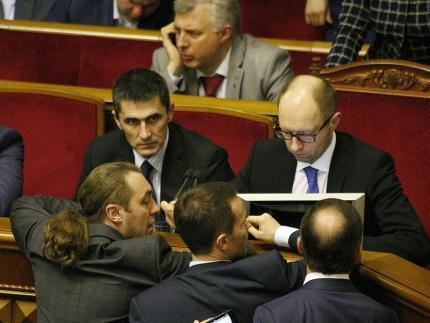
Three recent news items deserve our attention.
First the good news. According to the Russia-based Sociological Service of the Anti-Corruption Fund the vast majority of residents of Odessa and Kharkiv provinces support Ukrainian statehood and oppose Vladimir Putin’s New Russia (Novorossiya) project. A telephone survey of 1,000 people conducted on September 8th to 17th revealed the following attitudes:
87 percent stated they want “their region to remain a part of Ukraine,” as opposed to 3 percent who opted for membership in Russia and 2 percent who preferred New Russia.
34 percent want “Ukraine’s future” to be “tied to Europe,” 17 percent want it to be tied to Russia, and 17 percent wanted Ukraine to be “independent.”
43 percent said they didn’t understand, accept, or want to comment on the term “Novorossiya”; 14 percent said it was “bad”; 9 percent called it “nonsense” or a “figment”; 2 percent said it was “criminal” or “illegal”; and 13 percent identified it as a term for those regions that want to join the Russian Federation.
50 percent have a negative attitude toward Putin; 12 percent have a positive attitude; those who tend to the positive and those who tend to the negative are both at 6 percent.
In a word, the Novorossiya project is dead in Ukraine, and Odessa and Kharkiv are firmly in the Ukrainian camp.
Now for the not-so-good news. As the Ukrainian Weekly’s Kyiv correspondent, Zenon Zawada, points out in an e-mail distributed to his friends and colleagues, the current self-styled “kamikaze” government of Ukrainian Prime Minister Arsenii Yatseniuk hasn’t pushed through any reforms. Zawada poses several disturbing questions to Yatseniuk that both he and Ukrainian President Petro Poroshenko need to answer:
1. Why aren’t any constitutional reforms in the pipeline, as part of the Feb. 21 agreement to resolve the political crisis in Ukraine? (They were supposed to be *completed* by September.)
2. Why isn’t there a new election law, as agreed to in the Feb. 21 agreement and as promised by President Poroshenko?
3. Why hasn’t the investigation on the EuroMaidan crimes been completed? … Why haven’t there been any criminal convictions of the EuroMaidan’s persecutors?
4. Why is the National Guard being commanded by Stepan Poltorak, the head of the Kharkiv police academy who dispatched internal army soldiers to disperse the EuroMaidan?
5. Why do Russian banks continue to operate in Ukraine, financing the separatist groups?
6. Why did you claim a special fund will be created and supported by oligarchs and international donors to finance the Donbas self-governance zones if the Sept. 16 legislation create[d] a line-item from the state budget?
7. If the war continues for months or years, will you keep blaming it for the lack of reforms?
8. Why haven’t you begun any structural reforms at all, such as cutting unnecessary taxes (which you’ve been promising to do for the last several months) or restructuring and eliminating corrupt schemes from [the state energy firm] Naftogaz (rather than continuing to pour money into it with state-issued debt)?
War does excuse the Yatseniuk government of some of its initial reform inertia, but—when you consider that structural economic reform is the precondition of Ukraine’s ability to wage war and thus to survive—war cannot excuse it all. Indeed, the longer the war lasts, the lesser the excuse. The better than not-so-good news is that Poroshenko delivered a powerful speech on September 25th, in which he outlined a bold vision of simultaneous structural reforms that, if adopted, would amount to a “Big Bang.”
And now for the outrageous. Germany’s Foreign Ministry recently released an internal report that concluded that Russia “has under President Putin developed into an authoritarian state in almost every respect.” Most serious analysts detected the strong whiff of authoritarianism back when Putin and his cadre began speaking of “managed democracy” some 15 years ago. Hopefully, the stark reality check Putin provided with Russia’s invasion of Ukraine has cleared the vision of Germany’s policy elites. Better late than never, I suppose, though Germany’s economic entanglements and interdependencies will prejudice Berlin’s better judgment for years to come. At this rate Berlin will declare Putin’s aggression against Ukraine a “war” sometime in 2029.
The really outrageous news concerns another German entity, the tourist agency, Hansa Touristik GmbH. Here’s what the Kharkiv Human Rights Protection Group had to say about its recent antics:
On Sept 17 “Ocean Majesty,” a Greek luxury cruise liner operated by the German tourist agency Hansa Touristik GmbH flouted the international embargo and sailed from Sochi in Russia into the Crimea, arriving in Yalta at around 8.30 Kyiv time. While the FSB [the Russian Security Service] carried out an 11-hour search of the Mejlis [the Crimean Tatar Parliament] and men with machine guns raided a Mejlis member’s home, a major Crimean Tatar charity, and the Mejlis’s newspaper Avdet, 500 German tourists basked in the Yalta sunshine.
Shame on Hansa Touristik. Even greater shame on those 500 “ordinary” Germans, whose immoral behavior makes them complicit in Russia’s crimes against the Crimean Tatars.
OG Image: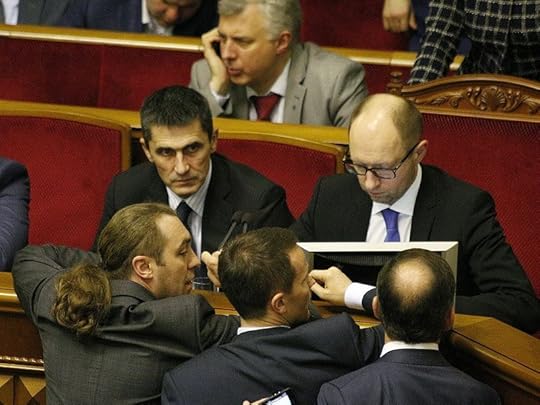 Europe and Central AsiaUkraine
Europe and Central AsiaUkraine
September 22, 2014
Will Putin's Successor Be Worse?
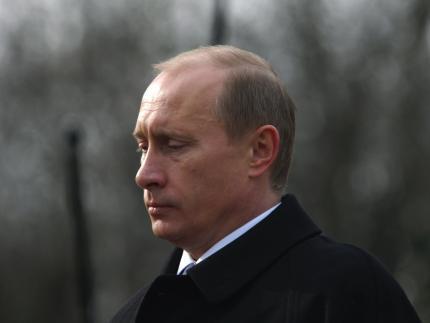
Who will succeed Vladimir Putin if and when he falls? Will things get better or worse? Those are the intriguing questions posed by Benjamin Bidder, Moscow correspondent for the German news weekly Der Spiegel.
Bidder concludes that the democrats have little chance of replacing Putin and that his successor is likely to be worse.
It takes little fantasy to imagine Putin’s political end. He cannot be voted out of office like his friend Gerhard Schröder. Two scenarios are possible: either the current political elite in the Kremlin installs a successor or the Russians get rid of Putin and his minions….
And then what? The fear is that someone could seize control of the Kremlin who thinks and acts more radically than Putin. The president created the preconditions of such a possibility with his own failed policies. If the Kremlin insiders want to find a successor, they will have to recruit him from the immediate circle of the current president. But Putin has reinforced hard-liners and pushed out the liberals.
The revolution scenario is no less disheartening. Power could be seized by forces from the extreme right and left. The boundaries between both are vague in Russia, as the name of such groups as the “National Bolsheviks” suggests.
Given his analysis, Bidder’s conclusion is logical:
Putin’s fall would be no solution for Russia or for Europe…. What follows therefrom? There is only the choice between bad alternatives. NATO must therefore discuss arming itself, if only to protect itself against what may come after Putin. But the West must also turn to Moscow as soon as possible, speak with it, and propose compromises. Not because Putin deserves it, but because Russia’s isolation creates more problems than solutions.
Unfortunately, Bidder’s analysis of who may succeed Putin is at best flawed, at worst dead wrong.
First, it’s premised on the view that it’s possible to be worse than Putin. That’s true, if you think of him as a run-of-the mill authoritarian. That’s not true, or not as true, if you think of him as a full-fledged fascist who has transformed Russia into an anti-modern, repressive, belligerent, imperialist rogue state.
Second, it’s theoretically possible for an even greater fascist to replace Putin. But how likely is it that Aleksandr Dugin or Vladimir Zhirinovsky would fill that role? Not at all. And if Putin’s replacement comes from within his inner circle, he’s likely to be a hard-liner who comes to power under conditions that militate against an even greater radicalism and fascism. Remember: when extremely powerful and charismatic dictators leave office, they always leave an institutional mess and a power vacuum behind them. Power struggles invariably result, precisely because there are no rules for finding a successor, and contenders for power have to woo support. In other words, Putin’s successor will first have to spend some time—months? years?—consolidating power before he can promote his own agenda.
Third, don’t discount the democrats. For one thing, Viktor Yanukovych’s downfall should, if nothing else, caution us against assuming that seemingly powerless political forces really are powerless. For another, the Russian democrats managed to organize massive demonstrations in Moscow just a few years ago. Putin’s supporters have never come out in equivalent numbers, and if the democrats establish themselves as a strong political force in the capital, that may suffice to tip the balance of succession in their favor. Finally, in times of crisis, the “street” often has greater influence on politics than the elites. Bidder mistakenly assumes that the insiders who make policy today will make policy after Putin leaves. Don’t be so sure.
Neither Russian, nor Soviet, nor world history supports Bidder’s view that bad dictators are followed by worse ones. Russian czars and czarinas came and went, with bad succeeding good, good succeeding bad, and mediocrities succeeding both. Soviet history is even less supportive of Bidder’s claims. True, the awful Lenin was succeeded by the dreadful Stalin, but Stalin was followed by the pretty good Khrushchev, the pretty good Khrushchev was replaced by the worse (though by no means Stalinist) Brezhnev, who in turn was replaced by the pretty good Gorbachev. And Gorbachev, after he fell in 1991, handed over power to the not bad Yeltsin, who was replaced by the awful Putin.
Last but not least, consider world experience. Who was worse—the Shah or the Ayatollah? Papa Doc Duvalier or Baby Doc Duvalier? It’s a toss-up. But there are very many examples—from Greece to Spain to Portugal to Brazil to Argentina to China—of lousy dictators being replaced with decent democrats or less lousy dictators.
In the final analysis, Bidder’s assessment amounts to an unwitting justification of dictatorial rule, repeating the self-serving claim that all dictators make: après moi, le déluge. In fact, world experience and both Russian and Soviet history suggest that Russia is likely to experience a better future if and when Putin finally goes. Getting rid of him, as quickly as possible, is a bet worth making—both by Russia and the West.
OG Image: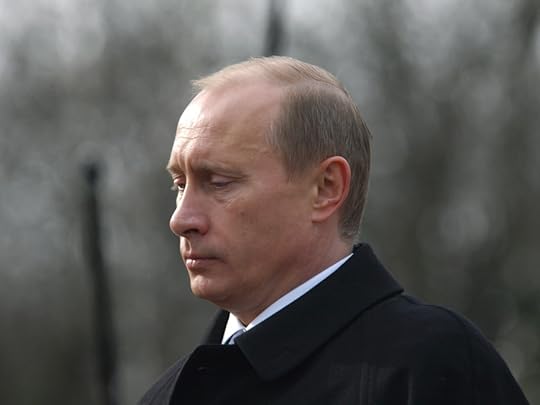 Europe and Central AsiaRussiaGermanGermanyVladimir Putin
Europe and Central AsiaRussiaGermanGermanyVladimir Putin
September 15, 2014
Ukraine to Wall Out Putin, Literally
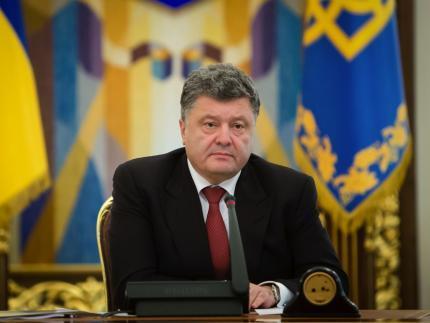
Ukrainian President Petro Poroshenko announced on September 10th that he intends to build an extensive set of fortifications along Ukraine’s frontier with Russia and the Russian-occupied enclave of the Donbas. Called “The Wall,” the defensive line would consist of a ditch, a “no-man’s land,” an actual wall, and watch towers.
Although the name brings to mind the Berlin Wall, Poroshenko actually compared Ukraine’s planned fortifications to the Mannerheim Line, the Finnish defense against the Soviet Union, clearly suggesting that he sees today’s Ukraine as interwar Finland and Putin’s Russia as Stalin’s USSR. That reference alone underscores just how profoundly Putin’s aggression against Ukraine has changed Ukrainian attitudes to Russia. The formerly big and intrusive strategic partner has become a mortal enemy akin to the Soviet empire under its genocidal dictator, Stalin.
More important than the symbolism is the fact that The Wall is an excellent idea with significant implications. It’s high time for Ukraine to do the only sensible thing it can do vis-à-vis its far stronger, imperialist neighbor: switch from offense to defense and build up a defensive capacity that would deter Putin even in his wildest dreams from embarking on a further aggression. It’s important to realize that Ukraine will never be stronger than Russia militarily. Calls for wars of liberation of the Crimea, or the Donbas enclave occupied by Putin and his proxies, are just demagogy.
That being the case, a Ukrainian withdrawal to strategically defensible positions is in order. Thereafter, those positions must be made sufficiently strong to prevent any Russian leader from expanding westward into Ukraine. “Sufficiently strong” means that the costs in terms of Russian soldiers’ lives would be high enough for Putin or his successor to think twice about an invasion. Were Putin determined to throw the entire Russian army against Ukraine and send tens of thousands of Russian soldiers to their deaths, no Mannerheim Line could stop him. The underlying logic behind any defensive line is thus that all leaders, even those that seem irrational, have some sense of the costs of Pyrrhic victories.
A ditch, a no-man’s-land, a wall, and watch towers may keep out small numbers of aggressors, but deterring a massive land attack by tanks, aircraft, and infantry will obviously require that Ukraine supplement the line with the requisite armaments. It’s clear that, among other things, armaments will need to include anti-tank missiles and limited-range surface-to-air missiles. Neither weapon could be construed by Russia as being offensive; both would inflict enormous damage on attacking Russian tanks and planes. Poroshenko would be well advised to collect a group of Western defense experts to advise Ukraine on just which armaments it does and does not need in order to fortify The Wall. And the sooner, the better.
The Wall has important political implications. By cutting itself off from Russia and the Donbas enclave controlled by Putin and his proxies, Ukraine will effectively be freezing the conflict and declaring that the enclave is Russia’s responsibility. Naturally, the Kyiv government will insist otherwise. But don’t be fooled by declarations of implacable determination to win back lost territory. A wall will keep the Russians out of Ukraine, but it will also keep Ukraine out of the Donbas enclave.
A frozen conflict will actually be to Ukraine’s benefit. The enclave, which is where much of the region’s population and industry were concentrated, is in ruins. Hundreds of thousands of middle-class professionals have fled and will not return. Industry is shrinking. Infrastructure has collapsed. All these negative tendencies will accelerate, as Putin’s terrorist proxies, remnants of the (formerly ruling) Party of Regions and the Communist Party, the Kremlin, the Donbas oligarch Rinat Akhmetov, and the Russian Orthodox Church duke it out over influence. In a word, the Donbas enclave is finished, and, as deindustrialization continues, depopulation will proceed apace. Whoever inherits the mess caused by Putin and his proxies will have a ball and chain on his leg. Fortunately for Ukraine, it doesn’t—and in all likelihood will not anytime soon—control the enclave. Rightly or wrongly, justly or unjustly, legally or illegally, the burden of control, and the burden of governance, will fall on Putin. Bully for him. The day is not far off when the economic disaster that is the Crimea and the Donbas will burden Putin, and he will be hard-pressed to claim that his imperialism has served Russia well.
So, sure, let Kyiv proclaim that it will never ever give up its sovereign territories. But then let Kyiv build The Wall, beef up its defenses, and get down to the business of fixing the country. Kyiv has time on its side. As I’ve frequently suggested, Putin’s fascist regime is doomed. Let it choke on the Donbas and the Crimea. Let it degenerate into an exclusively repressive regime. Let its economy decay thanks to Western sanctions. And let it remain isolated from the rest of the world and Ukraine. And then, when Russians reestablish a democracy, as one day they surely will, The Wall can come down.
OG Image: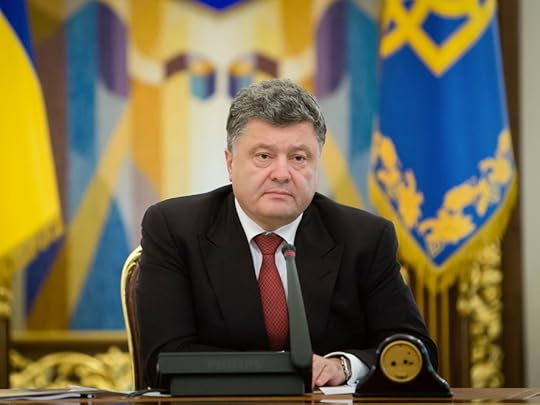 Europe and Central AsiaRussiaUkraine
Europe and Central AsiaRussiaUkraine
September 8, 2014
West's Refusal to Arm Ukraine Invites Guerrilla War
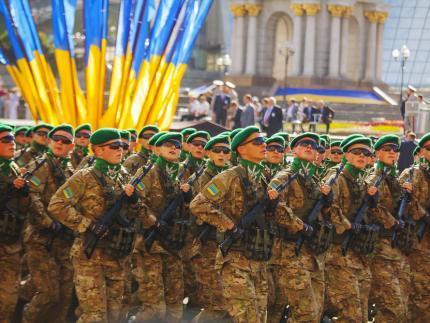
If Russia launches a full-scale invasion and Ukraine is unable to defend itself with its armed forces, the result will be a “people’s war” entailing enormous casualties and millions of refugees. Ukrainians, like the citizens of other countries on Russia’s borders, know that Vladimir Putin is an existential threat to their survival as a people. They also know they have no choice but to respond to continued Russian aggression with mass popular resistance.
Such a war—involving a partisan movement with widespread civilian participation—will be extremely costly. Hundreds of thousands of Ukrainians will die; streams of refugees will head west. In addition, Putin will have learned that he can have his way with the United States and Europe. Aggressors everywhere will have been emboldened.
If, however, Ukraine’s military has the military equipment needed to deter a Russian invasion, people’s war will not take place, a humanitarian catastrophe will be prevented, Europe will not be inundated with refugees, and the international order might not be toppled.
There are six arguments against the West’s arming Ukraine, and none of them is persuasive.
1. Arming Ukraine will provoke Russia to escalate. The argument is moot, and wrong, as Russia has been steadily escalating since March, despite the fact that Ukraine has received no armaments from the West.
2. Arming Ukraine will lead to war. This argument is also moot, and equally wrong, as Russia launched a war in late August (if not earlier), despite the fact that Ukraine has received no armaments from the West.
3. Arming Ukraine will lead to an arms race with Russia that the West will lose. This is the intellectually strongest argument and deserves extended and detailed attention to its flaws. The thinking behind this argument, beloved of “realist” academics and policymakers, goes as follows. Russia has a larger stake in Ukraine than the West; as a result, Russia will always be willing to up the ante, and any armaments supplied by the West will always be matched or exceeded by Russia. As a result, escalation will occur and the likelihood of war will increase. No less important, at some point, the West will lose its appetite for escalation and give in without having achieved anything other than an escalation of the conflict.
For starters, note that the part of the argument claiming that Western armament supplies will lead to an escalation of the conflict and war is moot and wrong, for the reasons mentioned above.
More important, this argument has two fatal flaws.
First, it assumes that Western and Russian appetites for providing arms are constant. It is true that the West might lose its appetite for arming Ukraine if it believes that Russia’s aggression against Ukraine is a local affair. But it is also true that the West might not lose its appetite for arming Ukraine if it believes that Russia’s aggression against Ukraine is a European affair. In the late 1930s, the European democracies initially had no appetite for countering Hitler’s aggression in Austria and Czechoslovakia. After the invasion of Poland, however, the democracies discovered that appetite and went to war against Germany. There is, in sum, no a priori guarantee that appetites—whether Western or, for that matter, Russian—will remain constant. There is, thus, also no reason to think that Russia will always outbid the West. One can easily imagine perfectly realistic circumstances—an economic collapse, a popular uprising in Moscow, the death of Putin—that would undermine this assumption.
Second, this argument misunderstands just what the point of Western armament supplies to Ukraine is. It is not to match the military capacity of Russia or to provide Ukraine with military superiority. If it were, the argument might be right to suggest that the West will always be outmatched by Russians determined not to face an existential threat from Ukraine. (Or, as I argued above, the argument might be wrong…) The real point of arming Ukraine is to make it capable of defending itself: of enabling it to deter a Russian attack or to make Russia pay a high price for any attack. If so, even a small amount of defensive armaments can enhance Ukraine’s defensive capacity—even if Russia ups the ante in response.
Here’s an example. Imagine that Country U has no anti-tank weapons and that Country R has 10 tanks. R can easily overrun U. Now imagine that U receives 10 anti-tank missiles from abroad, W, and that R increases its number of tanks to 20. R can still overrun U, but it will lose 10 tanks in the process. Will R be willing to accept such a loss? Maybe yes, maybe no. Assume now that R ups the ante to 50 tanks and that the weapons supplier W provides U with only 10 more anti-tank missiles. U remains outgunned (50 tanks to 20 anti-tank missiles) and would lose any encounter. But will R be willing to lose 20 tanks? Maybe yes, maybe no. Uncertainty enters the picture, and as R calculates its risks, it may decide that 10 or 20 tank losses are too many. Uncertainty thereby translates into a slightly enhanced Ukrainian ability to deter a Russian attack.
4. Arming Ukraine will make things worse for Ukraine. As my critique of arguments 1 and 2 showed, things have gotten worse for Ukraine in the absence of any armaments from outside. As my critique of argument 3 showed, things can only can better—even if only marginally—if it has an enhanced ability to deter aggression.
5. Arming Ukraine will drag the West into a war with Russia. This danger exists if and only if the West loses all sense of reality and decides to match all Russian armaments buildups with its own, up to and including Western troops. Rational Western leaders committed only to enhancing Ukraine’s defensive capacity will presumably not be that irrational. Western caution about providing Ukraine with armaments suggest that Western leaders are anything but reckless.
6. Arming Ukraine would create the impression that the Russo-Ukrainian conflict can be solved militarily. German Chancellor Angela Merkel just made this argument, but it is wrong precisely because it assumes that the West will engage Russia in an endless spiral of armaments deliveries. If, alternatively, the West is committed only to enhancing Ukraine’s defensive capacity in the manner described in my critique of argument 3, it would in fact be creating the impression that the conflict cannot be solved militarily.
The choice is the West’s: either provide Ukraine with the capacity to defend itself against Russian aggression or start building refugee camps and preparing expressions of outrage at Putin’s genocide against Ukrainians.
OG Image: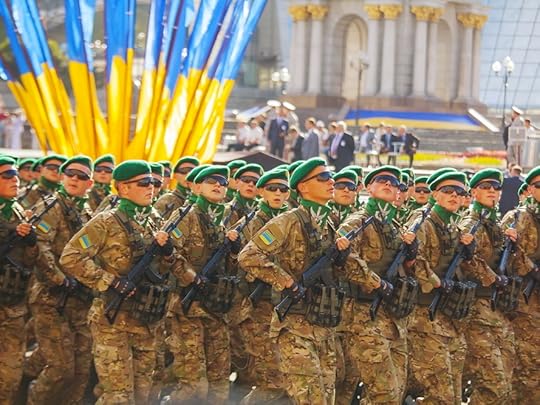 Europe and Central AsiaUkraineRussiaUnited StatesUSVladimir Putin
Europe and Central AsiaUkraineRussiaUnited StatesUSVladimir Putin
August 27, 2014
Loose Cannons and Ukrainian Casualties
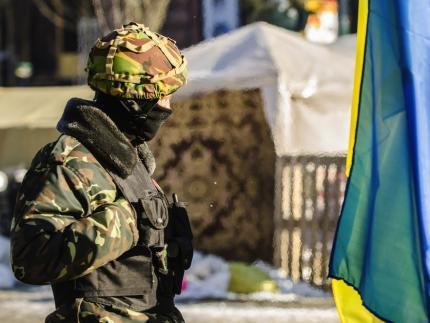
So now the number of dead Ukrainian soldiers is 722. The number of wounded is 2,625. The Ukrainian army keeps on making slow but steady advances; the pro-Russian terrorists appear to have suffered heavy losses; Russian regular forces are openly engaged in the fighting; Russia’s “humanitarian convoy” apparently looted some Ukrainian armaments factories on its way back home; and, on August 25th, Russian tanks crossed into Ukraine just north of the Sea of Azov.
All is definitely not quiet on the eastern front.
German Chancellor Angela Merkel visited Kyiv on August 23rd, where she expressed support of Ukraine. Some Ukrainians were unhappy that her support wasn’t stronger, but they should remember that her very presence in Ukraine on the eve of its Independence Day celebrations was a powerful message to Russia’s unconstitutionally elected president, Vladimir Putin.
Whether or not Putin chooses to heed that message is another matter. If he’s smart, he will. No country can take on the whole world. The United States, when it was still a “hyper-power,” tried, and you know how that ended. A “Belgium with the bomb” and lots of gas to sell is acting stupidly if it thinks it can get away with playing the world’s bully.
Putin, unfortunately, looks more and more like a loose cannon, an irrational leader who responds to his own internal demons and not to anything resembling logic or national interest. Significantly, when a German interviewer asked Merkel to explain just “what Putin wants,” she couldn’t answer, providing instead an elaborate argument for the need for a political solution.
Take that “humanitarian convoy.” Just what did it prove? That Russia can intervene in Ukraine? But it’s been doing that for two months, and everyone knows it. That Russia is humanitarian? But if it is, why all the subterfuge? That Russia is tough? But if it is, then why all the humanitarian rigmarole? The one thing the convoy didn’t prove is that Russia is reliable. Instead, the whole convoy business made Russia and Putin look like conniving SOBs.
The Russian terrorists in Ukraine look more and more like Putin, too. On Sunday, August 24th, they marched a column of Ukrainian prisoners down the main street in Donetsk. The amateur video I saw (subsequently “removed by the user”) showed a crowd of several hundred or several thousand people avidly jeering. “On your knees!” was one constant refrain. Well, marching the soldiers through this “corridor of shame,” as the terrorists call it, was bad enough (Human Rights Watch suggested it was a violation of the Geneva Convention), but heck, they’re showing off their booty. They’re trying to project strength. That’s quasi-understandable.
What was unforgivable—and terrifying—was what happened after the column passed. Several sanitation trucks followed in their wake, spraying water on the street. The loudspeaker announced that they were cleaning up after “the filth.” The crowd cheered. Obviously, it occurred to no one that the terrorists had adopted Nazi practices, having transformed the captured Ukrainians into “dirty Jews.” Nor did it occur to the terrorists or their admirers in Donetsk that they had just engaged in a weird inversion: the Nazis had the dirty Jews clean the sidewalks; the terrorists in eastern Ukraine cleaned the streets after the dirty Ukrainians had passed.
So what does Putin want? No one knows. How do you negotiate with someone who won’t tell you what he wants and keeps on acting as if he wants to destroy you? Merkel is right to want a political solution to the war. But politics, as she practices it, is about give-and-take, while politics, as Putin practices it, is about domination. For Merkel, other Western leaders, as well as President Poroshenko of Ukraine, politics is a positive-sum game, in which all can be winners. For Putin, it’s a zero-sum game, in which there can only be one winner: him. Worse, it’s not even clear what Putin sees as victory.
All we really know is that Putin and his forces are doing two things: killing Ukrainians, both armed and unarmed, both ethnic Ukrainians and ethnic Russians, and destroying the infrastructure and economy of the Donbas— not as collateral damage, but intentionally. Since his original goal—stated way back in late February, remember?—was to protect Russian speakers in Ukraine, all one can say is that Putin’s got a strange way of showing his love.
Speaking of Ukrainian deaths, I must mention one soldier in particular: the Ukrainian-American Mark Paslawsky. The 55-year-old West Point graduate and former investment banker had joined the volunteer Donbas Battalion and been killed on August 19th in a battle near Donetsk. I mention Paslawsky for two reasons.
I actually met him in mid-June when I had the privilege of visiting the camp outside Kyiv where the Donbas Battalion was in training. None of the soldiers introduced themselves with their real names, so I had no idea who he was. We spoke briefly, and I asked him how he came to speak such excellent English. He said he was Ukrainian, but had lived in New Jersey for many years. In a subsequent column, I noted that I felt odd talking to soldiers who might soon be dead: “What does one say to volunteer soldiers who will soon be deployed to eastern Ukraine and could be killed in a few days? I was tongue-tied, moved, and confused.” I meant that in the abstract. I never imagined that the genial, gray-haired man with the loping stride would be one of them.
The second reason I mention Paslawsky is that he was, after all, a Ukrainian American. In killing him—and make no mistake about it: Putin killed him—Putin has taken on, in addition to the entire world, the Ukrainian American diaspora. He probably thinks it’s a joke. But in killing a Ukrainian American, he’s made the war in Ukraine personal for Ukrainian Americans. Their intellectual, material, and political resources are far greater than Putin can imagine. Be forewarned, Vlad: diasporas have long memories. And this one will give you and your apologists in Russia and the West no rest.
OG Image: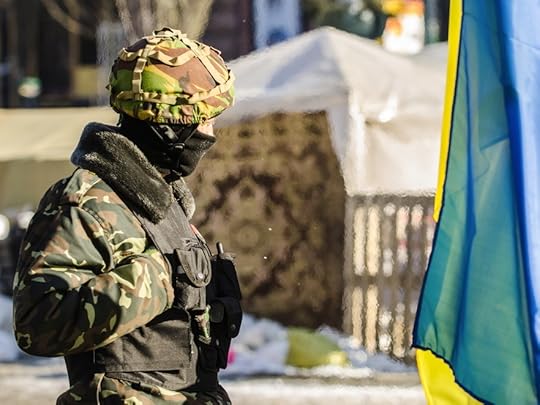 Europe and Central AsiaUkraine
Europe and Central AsiaUkraine
August 21, 2014
Hitler and Putin: A Tale of Two Authoritarians
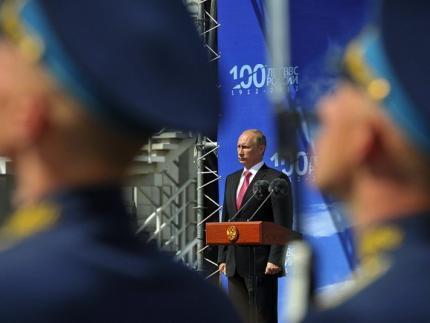
Will Russia’s unconstitutionally elected president, Vladimir Putin, unleash a full-scale land war against Ukraine?
I can give you ten reasons for every possible answer to this question. Which is to say that, like everyone else trying to divine Putin’s “mind,” I don’t know.
But there is one thing that I definitely do know. Suddenly, we are all talking about war in Europe. The one thing that was supposed to have become “unthinkable” and “unimaginable” after the end of the Cold War and the rise of the European Union has become perfectly thinkable and quite imaginable.
And all thanks to Putin. If tomorrow’s headlines scream “RUSSIA INVADES ESTONIA,” we’d be shocked, but would we be surprised?
Don’t blame the thinkability and imaginability of war on the Ukrainians. All they did was remove a corrupt dictator and embark on building a democracy. The Ukrainians didn’t invade Crimea. Nor did they arm separatist republics with Russian soldiers and weapons. That was Putin’s doing and only Putin’s doing.
There’s a lesson here, and it’s not either of the ones that are usually drawn: that Putin is a power-hungry madman, if you’re his critic, or that Putin is a shrewd statesman motivated by raison d’état and Realpolitik, if you’re his backer. The real lesson is that dictatorships, especially fascist dictatorships built on the ruins of collapsed empires, are prone to do bad things, such as engage in imperialist wars.
I’ve made the comparison many times before (starting in the late 1990s, by the way), but it’s worth reminding ourselves just how similar Russia’s and Putin’s trajectories are to those of post–World War I Germany and Adolf Hitler. The point is not to score easy debating points or to shake Germans’ assumptions about the uniqueness of Nazi evil, but to demonstrate that there are deeper structural reasons for Putin’s aggressiveness and indifference to international norms.
Both Germany and Russia lost empires and desired to rebuild them. Both Germany and Russia suffered economic collapse. Both Germany and Russia experienced national humiliation and retained imperial political cultures. Both Germany and Russia blamed their ills on the democrats. Both Germany and Russia elected strong men who promised to make them grand and glorious again. Both strong men employed imperialist arguments about “abandoned brethren” in neighboring states, remilitarized their countries, developed cults of the personality, centralized power, gave pride of place in the power structure to the forces of coercion, constructed regimes that may justifiably be called fascist, and proceeded to engage in re-annexing bits and pieces of lost territory before embarking on major landgrabs. Both strong men demonized friendly nations. Germany’s strongman ended up starting a world war. Russia’s strongman—well, we don’t know what he’ll do, but please do notice that a rigorous pursuit of the comparison does not bode well for peace in Europe or the world.
Democracy matters. Dictators are more prone to war precisely because they can manipulate public opinion and ruthlessly pursue whatever warped visions they have without much resistance from institutions and elites. Democratic presidents don’t have that luxury—as a rule of course. That’s why democracies plod along. That’s why they muddle through. That’s why they’re the worst form of government, as Winston Churchill observed, except for all the others.
Ukraine’s democracy has at best been crummy and creaky for the last two and a half decades. It’s done far too little about reform and it’s been much too enamored of corruption. As a result, Ukraine has muddled along, sometimes muddling up, sometimes muddling down. Change is imperative, and, thanks to the Maidan Revolution, everyone in Ukraine finally knows it. Stasis is bad, possibly unsustainable, probably destructive. And yet, and yet: Ukraine remains a democracy, far more so now than just a few months ago. It’s searching for answers to complex questions, balancing far too many interests and sensitivities, moving much too slowly to satisfy proponents of breakthroughs (and that includes me).
But do take note of one very important fact. Amid all this democratic sludge, independent Ukraine has been pacific for the entire time of its existence. At the same time, when provoked, as in the past few months, democratic Ukraine has also demonstrated that it can fight to defend itself and its values.
Which goes to show two things: that, except for the likes of Vladimir Zhirinovsky, Stephen F. Cohen, Marine Le Pen, and Aleksandr Dugin, even a crummy Ukrainian democracy is preferable to an efficient Russian dictatorship and that a war initiated by democratic Ukraine really is unthinkable and unimaginable.
Photo Credit: www.kremlin.ru
OG Image: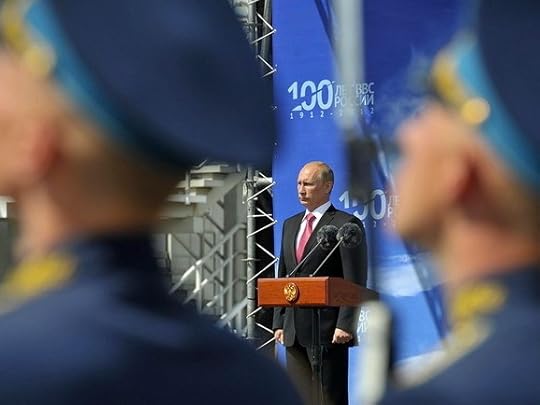 Europe and Central AsiaRussiaUkraineEstoniaVladimir Putin
Europe and Central AsiaRussiaUkraineEstoniaVladimir Putin
August 13, 2014
‘Criminal in the Kremlin’: An Interview with Professor Walter Clemens
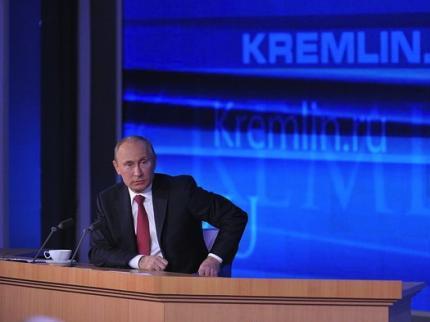
Below is an interview I conducted recently with Walter Clemens, a professor emeritus of political science at Boston University and an associate of the Davis Center for Russian and Eurasian Studies at Harvard University.
* * *
MOTYL: Walter, you’re well known for tackling complex moral and legal issues of international relations in your work. One of your books was Can Russia Change?
CLEMENS: I’m still doubtful.
MOTYL: Your current project is titled “Can—Should—Must We Negotiate with Evil? The World and North Korea.”
CLEMENS: The subtitle could also read “The World and Vladimir Putin.”
MOTYL: What should the international community do about Mr. Putin?
CLEMENS: He should be indicted and brought before the International Criminal Court. Putin is probably guilty of all types of transgressions the court is authorized to prosecute—genocide, crimes against humanity, war crimes, and aggression. As Russia’s president or prime minister, Putin dispatched Russian armed forces against the peoples of Chechnya, Georgia, and Ukraine while keeping them in a province of Moldova. His troops killed between 100,000 and 200,000 Chechens, split off South Ossetia and Abkhazia from Georgia, and watched as South Ossetians carried out ethnic cleansing of Georgian villages. Putin’s forces have seized Crimea, putting Tatars as well as Ukrainians at risk. Putin has fomented separatism in eastern Ukraine and sent several thousand Russians to fight alongside the separatists. He may not have intended for his proxies to shoot down a Malaysian airliner, but he provided the equipment and training that permitted them to do so and kill nearly 300 civilians. When weapons based in Russia strike targets inside Ukraine, however, there is no doubt about Putin’s intentions.
MOTYL: Do his actions actually meet the definitional requirements of the crimes you outline?
CLEMENS: The Rome Statute setting up the International Criminal Court in 2002 gave precise definitions of genocide, crimes against humanity, and war crimes—all of which fit Putin’s policies [pdf]. But the member states’ lawyers did not define “aggression” until 2010. According to this definition [pdf], aggression includes “the invasion … by the armed forces of a state of the territory of another state”; “annexation by the use of force of the territory of another state”; “bombardment by the armed forces of a state against the territory of another state”; and “the sending by or on behalf of a state of armed bands, groups, irregulars or mercenaries … against another state.” Putin’s forces have clearly committed all these forms of “aggression,” but the ICC cannot exercise its jurisdiction over such crimes before 2017 and until the requisite number of member states have given their approval. Meanwhile, it is clear that Putin’s Kremlin has violated the 1929 “Litvinov Protocol,” which put into force for Russia, Poland, Romania, Estonia, and Latvia the Pact of Paris outlawing war. That pact is still in force.
MOTYL: Very well, let’s agree that Putin’s armed forces are guilty on each of these counts as well as of committing crimes of genocide, crimes against humanity, and war crimes. Is the man Vladimir Putin guilty of these crimes as well? Couldn’t he argue that he knew nothing about them?
CLEMENS: Putin might counter that he bears no personal responsibility for what Russian forces have done. On the other hand, he has reigned as a virtual dictator over Russia since 1999 and cannot evade responsibility for the crimes his troops commit. Putin could deny that the ICC has jurisdiction, because Russia is one of 31 states that have signed but not ratified the Rome Statute. Pending ratification, however, Russia is obliged under international law not to violate its ICC obligations.
MOTYL: So who would bring charges against Putin?
CLEMENS: That’s where the complexities get deeper. The Rome Statute gives first jurisdiction to courts in the home country of the accused. Since Russian courts are puppets of the president, they cannot be expected to try and convict their boss. The United Nations Security Council could refer the Putin case to the ICC, but Russia would surely veto such a move.
Some 122 states have signed and ratified the Rome Statute. The statute provides that a party to the treaty “may refer to the prosecutor a situation in which one or more crimes within the jurisdiction of the court appear to have been committed” and request “the prosecutor to investigate the situation for the purpose of determining whether one or more specific persons should be charged with the commission of such crimes.” Three states party to the statute have cause to bring charges against Putin: Moldova, Georgia, and the Netherlands. Given that the Netherlands lost nearly 200 citizens on MH17, it probably has the strongest grounds for bringing charges against Putin. Georgia and Moldova, for their own reasons, have solid reasons to join the suit. Nongovernmental actors such as Human Rights Watch and Chechen organizations could also file charges. The Rome Statue permits the prosecutor to initiate investigations motu proprio, or on his/her own initiative, on the basis of information received from individuals or organizations.
Malaysia and Ukraine also have grounds to bring charges against Putin, because Flight MH17 belonged to Malaysia and was shot down in Ukrainian airspace. But their failure to ratify the statute disqualifies them from taking their complaints to the court. The United States has also disqualified itself by the George W. Bush administration’s decision to “un-sign” the Rome Statute negotiated and signed by the Clinton White House.
MOTYL: Do you seriously expect charges against Putin to be brought?
CLEMENS: Putin’s crimes rank with those committed by leaders in the former Yugoslavia who were charged and convicted of war crimes. But there are obstacles. Whereas complaints from ultranationalist Croats and Serbs about persecution of their heroes did not rattle the international community, many governments and businesses in Europe do not wish to offend the Kremlin. Even the United States prefers to retain Russian cooperation in many spheres, from outer space to North Korea.
Still, the climate is changing. Putin’s actions in late July–early August led the European Union and the United States to intensify their sanctions against Russia. To try and put the leader of a regional superpower in the dock would be a further step up the ladder. Significantly, Navi Pillay, the UN high commissioner for human rights, said the downing of the Malaysia Airlines jet may be a “war crime.” In July, the Court of Arbitration in The Hague ordered Russia to pay $50 billion in damages to shareholders in the defunct Russian oil company Yukos. That same month, Washington announced that Russia has been testing ground-based cruise missiles in violation of the 1987 Intermediate-range Nuclear Forces Treaty. These accusations come on top of other suspicions aroused by a string of unexplained murders of Russian journalists and others who challenged Putin over the years. And did not the recent cyber attacks against Ukrainian government offices in Kyiv and abroad originate in Putin’s Kremlin? A milieu of crime appears also to have spawned the theft by Russian gangsters of 1.2 billion usernames and passwords belonging to more than 500 million e-mail addresses around the globe.
The bottom line is obvious. If the world does not stand up to Putin today, as the Economist warned on July 26th, “worse will follow.”
Photo Credit: www.kremlin.ru
OG Image: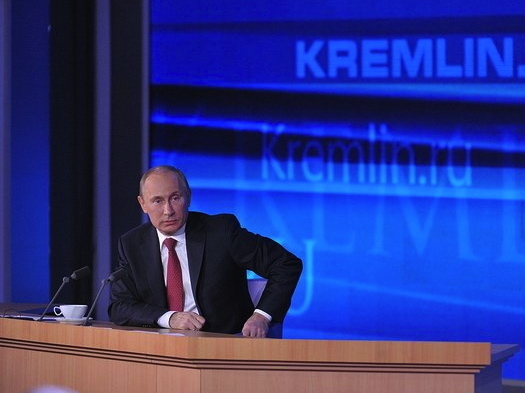 Europe and Central AsiaRussiaUSNorth KoreaVladimir Putin
Europe and Central AsiaRussiaUSNorth KoreaVladimir Putin
August 6, 2014
Recriminations and Denials After Putin
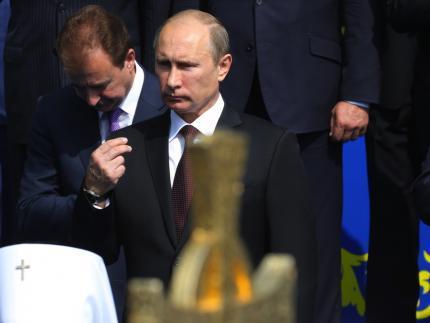
One of these days Russians will wake up from what they now think is a dream and realize that it was a terrible nightmare. They’ll realize that Vladimir Putin—their current hero and demigod—is really a loser and a thug who’s brought ruin to their country, ruin to their people, ruin to their ethnic brethren in Ukraine and other non-Russian states, and ruin to the world. They’ll realize that Putin is a criminal, that the regime he created is fascist, and that his policies are paranoid, delusional, destructive, and self-destructive to the point of being suicidal.
And that’s when the recriminations and denials will begin. There’ll be lots of finger pointing. “Blame it all on my neighbor,” many Russians will say, “He’s the collaborator. He’s the flag-waver. He’s the one who voted for Putin and attended all those mass rallies. And he did it voluntarily too.”
Most will insist they “knew nothing.” The war against Ukraine? “Gosh, there were rumors to that effect.” The destruction of Russians and Russian-speaking Ukrainians in the Donbas? “Lord, had we only known!” The billions that Putin and his pals purloined from the Russian Treasury? “More rumors!” The tens of thousands of Chechen deaths? The thousands of Ukrainian deaths? The hundreds of Russian deaths? “Rumors, rumors, rumors.”
Some Russians will realize that such denial is uncomfortably reminiscent of postwar German reactions to Hitler and his crimes. Death camps? The gassing of Jews? The destruction of Poland, Belarus, and Ukraine? The starvation of Leningrad? “Never heard of it! And believe me, had I only known, had I only known—I would’ve fought that criminal Hitler regime for sure! By the way, wasn’t Hitler really Austrian?”
A few brave Russian intellectuals will feel shame, guilt, and responsibility and call for lustration and trials. Most Russians will prefer to put the past behind them: “let bygones be bygones, let’s all be pals again.” What to do with Putin and his closest entourage will be a bit of a problem. Naturally, people will blame everything on him—their former hero and demigod. “He’s the criminal, he built the system, he started the wars, he bamboozled us: we’re innocent.” But putting him on trial could be inconvenient: Putin might spill the beans and reveal just how deeply popular he, his system, and his policies were.
Not putting a world-class war criminal on trial could be equally inconvenient. After all, Moscow is the Third Rome. Oh, if only Putin would make a run for Belarus, Kazakhstan, or China! Alas, that’s not likely: it would be too humiliating for him to seek refuge in a vassal state or among the overbearing Chinese. South America? Too far; besides, isn’t that where Nazis go to hide? Perhaps Germany or France? That just might work. Putin’s got some mighty powerful friends in the former and he received the Legion of Honor decoration from the latter. A Putin-Schröder Peace Institute funded by all those purloined billions in Berlin? Warum nicht? Residence in Baby Doc Duvalier’s former villa in France? Pourquois pas?
Germany and France will be as eager to forget Putin’s crimes as most Russians. Ukrainians and other non-Russians will be less quick to do so. Victims of aggression, war, and genocide tend to remember the pain. Whom will they blame? Putin and his system, definitely. But millions of fingers will also be pointed at Russians. “Why did our self-styled brothers enthusiastically support Crimea’s annexation and the war in eastern Ukraine? Why did they look the other way as Russian forces and Russian proxies killed thousands and destroyed the Donbas? Why did no one protest? How could they believe that our efforts to establish a democracy were anti-Russian? How could they possibly believe that we were ever anti-Russian?” Expect Ukrainians to insist on reparations. Expect Russians to shrug in response.
Ukrainians will look back at the 2014 Russo-Ukrainian War as their third bloody encounter with Russia in the last 100 years. Russian Reds and Whites crushed Ukrainian independence in 1917–1921. Soviet Russians then crushed the Ukrainian liberation movement in Western Ukraine in 1945–1954. Then, in 2014, Putin’s Russians and their proxies tried to crush independent Ukraine.
And failed.
Putin’s failure is as evident now as are his crimes. He’s lost Ukraine. He’s destroyed the Donbas. In a word, he’s lost. The most he can do now is kill more Ukrainians and destroy more cities.
One day, when they finally wake up and realize their hero was a ruthless dictator, Russians will understand just how enthusiastically complicit they were in his evil—up to the very end.
OG Image: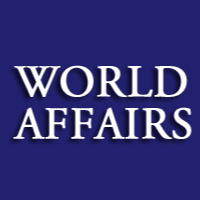 Europe and Central AsiaRussiaUkraineVladimir Putin
Europe and Central AsiaRussiaUkraineVladimir Putin
July 29, 2014
An Interview with Jiri Valenta
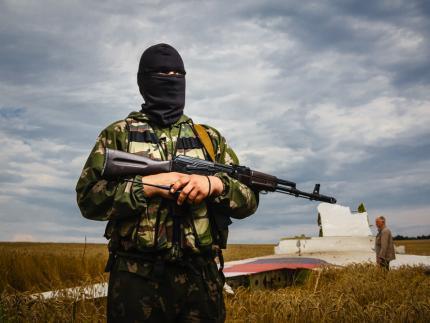
Below is an interview I conducted recently with Jiri Valenta, a distinguished scholar of Soviet and post-Soviet studies.
* * *
MOTYL: Jiri, you’re one of the world’s most experienced and knowledgeable observers of Russia. How would you characterize the downing of Malaysian flight MH17 and the ongoing Russian war against Ukraine?
VALENTA: The ongoing war in Ukraine has involved a covert military intervention by Russia that is slowly becoming overt. The downing of the Malaysian plane is a game-changer. Thus, as bodies arrive in the Netherlands, two more Ukrainian planes have been downed and a new deployment of Russian hardware is pouring into Ukraine. The Russian Duma has held an unexpected session. There is again the possibility of a large Russian invasion.
At the same time, MH17 has been catastrophic for Putin. Up until now, he has been very successful with the bloodless annexation of the Crimea, deft handling of the Middle East, a gas deal with China, and a productive visit to Latin America. But these successes have been torpedoed by the missile that downed MH17. As with the 1983 downing of KL007, Cold War tensions are rising to fever pitch.
MOTYL: Unsurprisingly, Russian President Putin and the pro-Russian terrorists deny all responsibility for the airline tragedy. Is Putin acting wisely? Isn’t the evidence ultimately going to make him look very bad? Isn’t he maneuvering himself into a dead end?
VALENTA: The plane’s downing has galvanized Europe. In 1983, there were questions about a US espionage plane following KL007. Not so now. The US intelligence interpretation has been confirmed even by some Russian commanders. Western Europe is finally turning against Putin. Great Britain just reopened the polonium poisoning death of Putin’s severe critic, Alexander Litvinenko. Because of MH17’s preponderance of Dutch victims, Holland might become the leader in imposing tough new EU sanctions. The compromised crime scene—the bodies robbed and left in the sun for days—have created an anti-Russian atmosphere in Europe, North America, and Australia. Feeling cornered, Putin is in attack mode. Yet should he proceed, this will not be the kind of low-cost battle he likes.
The French projected delivery of two helicopter aircraft carriers to Russia must be halted. As in the Polish crisis of 1981–82, France is again sabotaging joint sanctions against Russia. In fact, the debate within the Western alliance on sanctions is much reminiscent of the one that occurred after the imposition of Polish martial law. The US should even consider buying these carriers from France. This would prevent Russian dominance of the Black Sea and smother Russian interventionism in Ukraine and Georgia.
[See “NATO Should Buy French-built Warships.”]
MOTYL: There have been some influential voices in the West who have completely adopted Putin’s line. How would you assess Professor Stephen F. Cohen’s unrelenting Putinophilia? It seems that the more outrageous Putin’s behavior gets, the more arrogant Cohen’s apologias become.
VALENTA: Years ago Steve wrote a powerful, well-researched biography of Nikolai Bukharin that was influential in shaping some of Gorbachev’s ideas. He seems to have since engaged primarily in sophisticated but, above all, not well researched polemics. He is not a Ukrainian expert. Unfortunately, his exaggerated claims about the influence of Ukrainian right-wingers, called “fascists” by Putin, in Ukraine’s revolutionary process, only upholds Russian propaganda.
Sadly too, Cohen is poisoning the image of Ukrainian democrats. Now he is claiming the MH17 downing was the result of the Kyiv government’s offensive in the Eastern regions. He completely disregards Russia’s illegal occupation, through its terrorist proxies, of a sovereign state.
MOTYL: How do you explain Cohen’s extraordinary moral blindness?
VALENTA: Rarely in Steve’s post-Bukharin work do I find the kind of deep analysis of Russian conduct that I find, for example, in Richard Pipes’s memoir, Vixi. There seems, instead, to be a focus on a contrarian view at any cost.
MOTYL: How do you explain the remarkable fact that the extreme left and the extreme right in both the USA and Europe support Putin?
VALENTA: Skilled at image-making, and being a formidable politician, Putin has indeed found prominent supporters on both sides of the Western political spectrum, e.g., former German Chancellor Schröder in Germany, a social democrat, and Berlusconi, the conservative, former center-right leader of Italy. In both cases, financial dealings trump all other considerations.
MOTYL: How should democracies and the world media respond to the prevarications of people like Professor Cohen?
VALENTA: Cohen and I were both asked to contribute to a memorial publication for Richard Pipes’s 90th birthday. Steve wrote that he and Pipes, as “political adversaries,” were hired by NBC in 1984 “to argue about Russia on the Today Show.” Some formidable Russian specialist should be dialoguing with Steve now. There are genuine Ukrainian experts like you. There are also those who study Russian interventionism and global policies like Dimitri Simes and Angela Stent.
Cohen-like views are arising as President Obama has not responded adequately to the Ukrainian crisis. Putin’s intervention in Ukraine is partly a function of what Fritz Kraemer would call “provocative weakness.” As the world is engaged in several world crises, the commander-in-fundraising must finally become the commander-in-chief. In Vienna, Khrushchev similarly measured Kennedy as a paper tiger in 1961. His perceptions helped to precipitate the Cuban Missile Crisis a year later.
My wife, Leni, and I proposed in the 4/21/14 Kyiv Post that only lethal arms, coupled with powerful energy sector sanctions, are likely to deter Putin’s ambitions. The US should also provide Kyiv with strategic intelligence and sophisticated communications equipment. Notice that, while Russia gifts heavy military hardware to the terrorists, we are primarily providing meals to the Ukrainian army. After Holland’s day of mourning, let us hope the Dutch prime minister leads the effort to come up with a tough response by the EU. In any case, the fate of Eastern Ukraine will be primarily decided on both the battlefield and through negotiations.
The chief lesson of MH17 is the need to stand up to Vladimir Putin and aid Kyiv in defeating the pro-Russian terrorists. Yet as former Foreign Minister Ivanov blogged at the Russian International Affairs Council [RIAC] site, “The US and Russia Need Each Other Now More than Ever.”
Indeed, in on our own RIAC blog, our jvlv.net website, and in the National Interest, Leni and I have advocated partnership with Russia against Islamist, Nazi-like terrorism. Yet as we put it in our RIAC response to Ivanov, “First we must conduct ourselves like civilized nations!”
MOTYL: Jiri, thank you for your insights.
OG Image: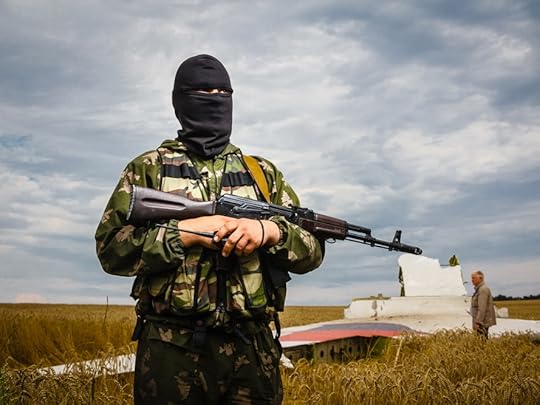 Europe and Central AsiaRussiaMalaysiaUkraineNetherlands
Europe and Central AsiaRussiaMalaysiaUkraineNetherlands
July 18, 2014
How Much Are Ukrainian and Malaysian Lives Worth?
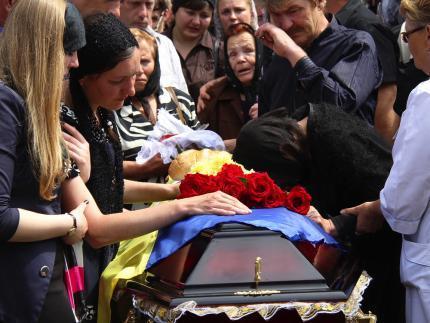
When Vladimir Putin’s proxies shot down a Malaysian Airlines jet with close to 300 passengers over eastern Ukraine on July 17th, I was shocked.
But I wasn’t shocked on July 15th, when the former head of the Ukrainian General Staff stated that 330 Ukrainian soldiers had died in the course of Kyiv’s anti-terrorist operation in eastern Ukraine, while the press liaison of the National Security and Defense Council said the correct number was 258. Both numbers were immediately wrong, as some 10 soldiers were killed that day.
The sad fact is that I’m getting used to Putin’s killing spree.
I still remember when the first demonstrator was killed on the Maidan back in January. What a shock that was. And then the mass sniper shootings in late February. What an outrage. The victims came to be known as the Heavenly Hundred and memorials to them still dot the area around Kyiv’s Independence Square.
Now, I read of another 5 or 10 or 15 soldiers being killed and I shrug. Is it 258 or 330? Do they have names? Did they ever have lives? Will they be remembered?
In the meantime, Putin’s commandoes keep on killing. To what end?
The Russian militants in eastern Ukraine have lost the battle for the hearts and minds of the local population. The formerly pro-Russian populations that the Ukrainian army recently liberated have been genuinely relieved to be free of Russian rule. Unsurprisingly, Putin’s standing in the Donbas, a region that traditionally had regarded him with admiration, has plummeted.
What can continued Russian escalation of the bloodshed accomplish? It can inflict harm on the Ukrainian army and volunteer forces—and only increase Ukrainian soldiers’ resolve to fight. It can increase the physical destruction of the Donbas—and only further alienate civilians. It can encourage the militants to engage in more human rights abuses and atrocities—and thereby outrage the international community. It could even impel the morally desensitized Europeans to impose genuinely painful sanctions on Russia.
And just what does Russia gain from continued escalation? It could establish control over parts of the Russo-Ukrainian border and save its proxies from total defeat. That would permit Putin to save face with his cronies and a Russian population that’s been whipped up to a hyper-nationalist frenzy. But this victory would at best be Pyrrhic. Would Russia annex the territories it devastated? Would it eventually retreat? Neither option qualifies as a strategic victory.
The fact is that Putin has maneuvered himself and Russia into a dead end.
Having seized the Crimea and provided the insurgents in eastern Ukraine with personnel, advice, money, and arms, Putin has only succeeded in galvanizing Ukrainians—both Ukrainian and Russian speakers—against himself and imbuing them with a sense of unity, purpose, and patriotism that had previously eluded them . Ukrainians know that their survival, as a country and as a nation, is on the line: they have no choice but to fight. At this point, nothing short of Kremlin-sponsored genocide and ethnic cleansing would end Ukrainian resistance.
Meanwhile, despite the growing numbers of Ukrainian deaths, France insists that it will go ahead with the sale to Russia of two Mistral-class assault ships. No matter that Russia has invaded Ukraine. No matter that war—remember: it used to be “unthinkable” in Europe—has come to Europe. No matter that Europeans are dying every day. The sale must go on. After all, 1,000 jobs are at stake.
If you figure that, thus far, about 100 Ukrainians lost their lives on the Maidan and another 100 civilians and 275 Ukrainian soldiers have been killed in the war with Russia, then, all told, about 500 Ukrainians have died for “liberté, égalité, fraternité.” Which translates into one Ukrainian life for two French jobs—or exactly 166.66 lives per inspiring word. At the rate things are going, one Ukrainian life will soon be worth far less than one French job. In a year or two, it might even go for the price of a steak frites on the Boul’ Mich. The good news is that, unless Putin’s proxies shoot down more Malaysian airliners, the value of one Malaysian life will remain constant at 3.33 French jobs.
Putin recently called Nazi propaganda chief Joseph Goebbels a “talented person” who was “achieving his goals.”
So, evidently, is Putin.
So who’s next? Estonia, Latvia, or Delta?
OG Image: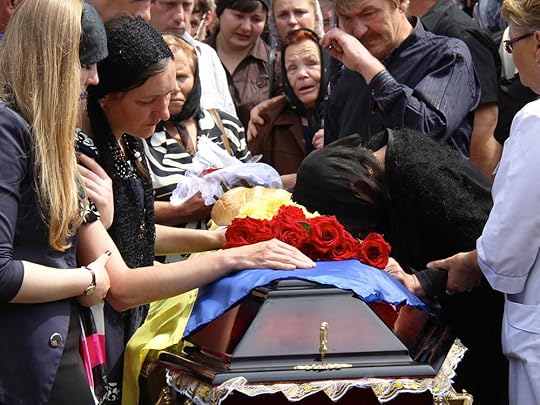 Europe and Central AsiaUkraineMalaysia
Europe and Central AsiaUkraineMalaysia
Alexander J. Motyl's Blog
- Alexander J. Motyl's profile
- 21 followers



